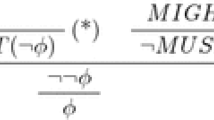Abstract
Part of what makes working with modals such a tricky business is that apparent modal forms are deployed in all sorts of ways in language. In this paper I explore an interesting example of an apparent modal—the Blofeld case—which was introduced by Gilles and von Fintel as part of their argument against context of assessment accounts of epistemic modals. I argue that the example is subtle, and that the apparent modal may not be an epistemic modal at all—it could be a scalar modifier that merges or “incorporates” with the matrix verb, weakening the meaning of the matrix verb. If apparent modals are used as scalar modifiers and are subject to movement and incorporation, then the surface language of modality may be throwing us some crafty head fakes. Caution is advised.
Similar content being viewed by others
Notes
If you don’t like the idea that utterances are true or false we can say that Eve judges that the proposition expressed by Pat’s utterance of (1) is false.
von Fintel and Gilles (2011) draw a different lesson from this case. They think (3) is an example of our ability to target the embedded proposition (embedded inside the modal claim). I’ll come back to this point in the conclusion.
If knowledge were the norm of assertion then Pat might be somewhat culpable, but it seems to me that modal cases like these show precisely that knowledge is not the norm of assertion. In any case, there are different kinds of culpability and Pat’s culpability for being wrong in this case is quite minimal. Kim has no business making an issue out of it.
Thanks to Richard Larson for this observation.
Could ‘must’ be a strengthening element? The test would be examples like ‘Blofeld wondered if Bond must be dead’. Does this suggest Blofeld has a stronger attitude than wondering regarding Bond’s suggested death? (For example suspecting?). My judgments on these cases are infirm.
References
Baker M (1988) Incorporation. University of Chicago Press, Chicago
Egan A (2007) Epistemic modals, relativism, and assertion. Philos Stud 133:1–22
Egan A, Hawthorne J, Weatherson B (2005) Epistemic modals in context. In: Preyer G, Peter G (eds) Contextualism in philosophy. Oxford University Press, New York, pp 131–169
Larson R, den Dikken M, Ludlow P (2007) Intensional transitive verbs and abstract clausal complementation. SUNY, Stony Brook. http://semlab5.sbs.sunysb.edu/~rlarson/itv.pdf
Lightfoot D (1979) Principles of diachronic syntax. Cambridge University Press, Cambridge
MacFarlane J (2011) Epistemic modals are assessment-sensitive. In: Egan A, Weatherson B (eds) Epistemic modals. Oxford University Press, Oxford, pp 144–178
May R (1985) Logical form: it’s structure and interpretation. MIT Press, Cambridge
Roberts I (1985) Agreement parameters and the development of English modal auxiliaries. Nat Lang Linguist Theory 3:21–58
Stephenson T (2007) Judge dependence, epistemic modals, and predicates of personal taste. Linguist Philos 30(4):487–525
von Fintel K, Gillies AS (2008) CIA leaks. Philos Rev 117(1):77–98
von Fintel K, Gillies AS (2011) Might made right. In: Egan A, Weatherson B (eds) Epistemic modals. Oxford University Press, Oxford, pp 108–130
Warner A (1993) English auxiliaries: structure and history. Cambridge University Press, Cambridge
Acknowledgments
Thanks to John Hawthorne, Richard Larson, Heidi Savage, and Juhani Yli-Vakkuri for discussion.
Author information
Authors and Affiliations
Corresponding author
Rights and permissions
About this article
Cite this article
Ludlow, P. Incorporation and Alleged Epistemic Modals. Topoi 36, 155–159 (2017). https://doi.org/10.1007/s11245-015-9348-x
Published:
Issue Date:
DOI: https://doi.org/10.1007/s11245-015-9348-x




